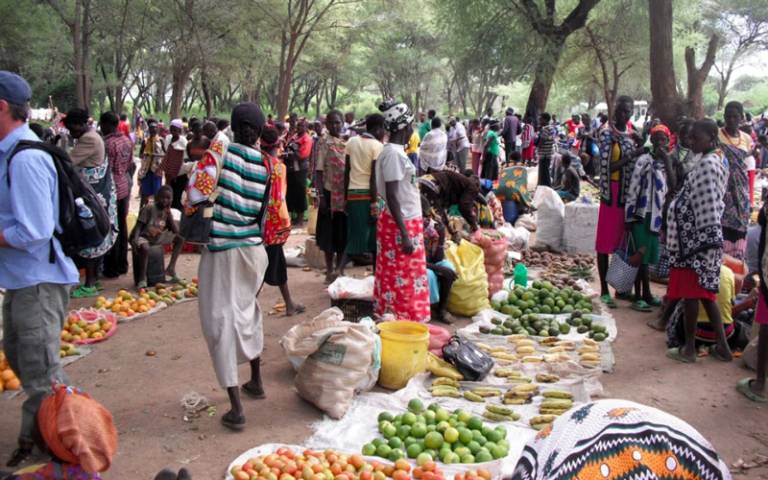Launch of Prosperity Co-Lab (PROCOL) Kenya
02 November 2018, 10:00 am–4:00 pm

The Institute for Global Prosperity launches Prosperity Co-Lab (PROCOL) Kenya: a program of collaboration, research and partnership, with invited stakeholders from Kenyan national and county governments, international organisations, Kenyan Universities and local community groups
Event Information
Open to
- Invitation Only
Organiser
-
Dr Matthew Davies
Location
-
British Institute in Eastern AfricaLaikipia RoadKileleshwa NairobiNA
The event
At this event the Institute for Global Prosperity at University College London will launch a call for a novel program of collaboration and research. We aim to transform the ways in which Prosperity is understood and how it may be attained and are calling for partnerships to undertake original transdisciplinary research leading to the co-design of new social, economic and environmental policies. We aim to produce robust empirical evidence to support decision-making and generate positive process of change. We especially want to work with County Governments, National Ministries and major organisations working towards sustainable and resilient livelihoods, communities and ecologies.
Why Prosperity Co-Lab Kenya?
Sustainable Prosperity remains a major challenge across sub-Saharan Africa. Six decades of post-colonial national, international and NGO-led development practices have failed to deliver either sustainability or enhanced livelihoods and well-being. Standard economic models and top-heavy governance continue to perpetuate inequality, injustice and environmental degradation. The Institute for Global Prosperity has been working in Kenya and across Eastern Africa since its inception. Our aim is to re-think current economic, policy-making, and environmental structures and institutions. While Kenya embodies may of the challenges faced across sub-Saharan Africa, we also see Kenya as a hub of innovation and inspiration, and we aim to foster home-grown solutions to these challenges. Working with multiple partners we will co-design alternative livelihoods, develop consensus-based decision making and re-configure human-nature relationships in ways which are resilient, sustainable and socially just.
We begin with the premise that developing more holistic, inclusive and locally contextual notions of Prosperity must be the first step in re-working the present to positively shape the future. These notions of Prosperity must also include the non-human natural world and consequently in Kenya our focus pivots around the concept of ‘Natural Prosperity’ and the linking of this to wider perspectives on social and economic prosperity. Our vehicle for this work is Prosperity Co-Lab (PROCOL) Kenya.
At this event we will launch PROCOL Kenya as a partnership with invited stakeholders from Kenyan national and county governments, international organisations, Kenyan Universities and local community groups. PROCOL Kenya will begin by mapping out a new paradigm for sustainable ecological management and future rural livelihoods, based on a re-valuing of nature and the concept of Natural Prosperity. Drawing on IGPs Prosperity Collaborations and Prosperity Metrics work from elsewhere in the world, we will re-map metrics of well-being and quality of life on to measures of environmental quality, linking these explicitly to the Sustainable Development Goals (SDGs) and the four pillars of Kenya’s Vision 2030. Our aim is to re-think the delivery of the SDGs and Vision 2030 in light of climatic and demographic change and in ways which are resilient, sustainable and both socially and environmentally just.
The rigorous empirical foundations for this work will be an extensive program of natural and social capital mapping. We aim to begin first with five key Kenyan Counties representing a diversity of socio-environmental challenges. This empirical work will collate existing social, economic and environmental statistics and combine these with comprehensive mapping of the natural environment and targeted surveys of local communities to better understand existing ambitions, needs and understandings of Prosperity. Natural Capital mapping will employ a range of satellite remote sensing to assess quality, potential and changes to land-use, including assessments of vegetation, hydrology and soils. These original data will be related to downscaled climatic predictions to model likely future changes and potentials at the County Level and at a resolution not yet attempted in sub-Saharan Africa. We will also build a common data sharing platform for use across the counties. This will provide the selected counties with an unparalleled degree and quality of synthesised information, generating a robust evidential base from which to co-design policy interventions at the County level. We further see this work as scalable and replicable across Kenya and beyond.
Our work in Kenya is underpinned by a wealth of previous research and expertise. Our Project team has more than five decades’ experience of conducting both natural and social science research in the country. Much work has focussed on agricultural development and environmental change in Elgeyo-Marakwet County. We have worked with local farmers to map out the complexities of sustainable local farmer managed systems of agriculture and irrigation, documented demographic and livelihood change, examined indigenous knowledge of a wide diversity of crops, food and useful medicinal plants. We have undertaken biodiversity surveys, and recorded patterns of farmer managed soils. We have used these data to demonstrate the innovation and cultural resilience of existing practice in the face of climatic and demographic change. Over the last three years, we have particularly focussed on issues around the Land-Water-Food Nexus, funded by a research grant from the Economic and Social Research Council (ESRC) and the Nexus Network. We have also examined the history of failed external interventions and explored how such top-down applications often dismiss, and at times undermine, existing resilient practice. Other programmes of work have examined the challenges around forest degradation, management and livelihoods in the Cherangani Hills and networks for alternative and herbal medicine. Ongoing work explores the impacts of technology on innovative ‘digital farmers’.
PROCOL Kenya is led by Professor Henrietta Moore, Professor Jacqueline McGlade, Dr Matthew Davies and Dr Wilson Kipkore.
 Close
Close

